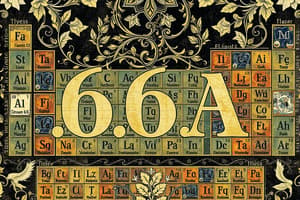Podcast
Questions and Answers
Which type of arsenic is commonly referred to as 'White Arsenic'?
Which type of arsenic is commonly referred to as 'White Arsenic'?
- Cu Aceto Arsenate
- Arsenic Trioxide (correct)
- Arsenopyrite
- K Arsenite
What is the antidote for arsenic poisoning mentioned in the content?
What is the antidote for arsenic poisoning mentioned in the content?
- Sodium thiosulfate
- Activated charcoal
- Acetylcysteine
- BAL (correct)
Which of the following arsenic compounds is known as 'Paris Green'?
Which of the following arsenic compounds is known as 'Paris Green'?
- As+3
- Cu Aceto Arsenate (correct)
- K Arsenite
- H3PO4
What is a notable characteristic of arsenic exposure as it relates to nails?
What is a notable characteristic of arsenic exposure as it relates to nails?
Which compound is associated with ‘Fowler’s Solution’ in the treatment of certain conditions?
Which compound is associated with ‘Fowler’s Solution’ in the treatment of certain conditions?
Which of the following elements is characterized by an outer s2p3 electron configuration and can exhibit 3+ and 5+ oxidation states?
Which of the following elements is characterized by an outer s2p3 electron configuration and can exhibit 3+ and 5+ oxidation states?
What is the primary use of nitrogen gas in medical applications?
What is the primary use of nitrogen gas in medical applications?
Which of the following statements about phosphorus is correct?
Which of the following statements about phosphorus is correct?
Which of the following is NOT a use of liquid nitrogen?
Which of the following is NOT a use of liquid nitrogen?
Which of the following elements does not share the same tendency to accept electrons as the others in Group V-A?
Which of the following elements does not share the same tendency to accept electrons as the others in Group V-A?
What is the main source of antimony mentioned?
What is the main source of antimony mentioned?
Which of the following is a pharmaceutical use of antimony compounds?
Which of the following is a pharmaceutical use of antimony compounds?
What is the composition of Babbit metal?
What is the composition of Babbit metal?
What is the active ingredient in Devrom®?
What is the active ingredient in Devrom®?
What is the antidote for the adverse effects caused by antimony?
What is the antidote for the adverse effects caused by antimony?
What is the color of the precipitate formed when Sb3+ reacts with H2S?
What is the color of the precipitate formed when Sb3+ reacts with H2S?
Which bismuth compound is known as 'White bismuth'?
Which bismuth compound is known as 'White bismuth'?
Which of the following statements about Bi3+ and its precipitate with H2S is correct?
Which of the following statements about Bi3+ and its precipitate with H2S is correct?
What reaction is observed when NH4+ is treated with Nessler’s reagent?
What reaction is observed when NH4+ is treated with Nessler’s reagent?
What is a characteristic property of tantalum?
What is a characteristic property of tantalum?
What color change occurs when NH3 is detected in a strong alkaline medium?
What color change occurs when NH3 is detected in a strong alkaline medium?
Which oxidation states do the elements in group VB predominantly exhibit?
Which oxidation states do the elements in group VB predominantly exhibit?
Which statement accurately describes the volatility of higher oxidation states in group VB elements?
Which statement accurately describes the volatility of higher oxidation states in group VB elements?
What precipitate is formed by the reaction of Na2SnO2 with Bi3+?
What precipitate is formed by the reaction of Na2SnO2 with Bi3+?
What is a characteristic feature of Vanadium?
What is a characteristic feature of Vanadium?
Which of the following describes the behavior of group VB elements in finely divided form?
Which of the following describes the behavior of group VB elements in finely divided form?
Flashcards
Arsenic
Arsenic
A metalloid found in various forms, including arsenic trioxide (As2O3), arsenic pentoxide (As2O5) and arsenic sulfide (FeAss). It is a protoplasmic poison affecting cellular function.
Arsenic Trioxide (As2O3)
Arsenic Trioxide (As2O3)
The most common form of arsenic, often referred to as "white arsenic." It was historically used as a tonic and an anti-leukemic agent.
Paris Green
Paris Green
A poisonous arsenic compound used as a pesticide and historically in paints.
Fowler's Solution
Fowler's Solution
Signup and view all the flashcards
BAL (British Anti-Lewisite)
BAL (British Anti-Lewisite)
Signup and view all the flashcards
Group V-A Elements
Group V-A Elements
Signup and view all the flashcards
What are the elements in Group V-A?
What are the elements in Group V-A?
Signup and view all the flashcards
Nitrogen Gas: Inertness
Nitrogen Gas: Inertness
Signup and view all the flashcards
Nitrogen Gas: Uses
Nitrogen Gas: Uses
Signup and view all the flashcards
Nitrogen: Biological Significance
Nitrogen: Biological Significance
Signup and view all the flashcards
CeSO4
CeSO4
Signup and view all the flashcards
Antimony glance
Antimony glance
Signup and view all the flashcards
Antimony Potassium Tartrate
Antimony Potassium Tartrate
Signup and view all the flashcards
Babbit Metal
Babbit Metal
Signup and view all the flashcards
Silver Nitrate
Silver Nitrate
Signup and view all the flashcards
Bismuth Subcarbonate
Bismuth Subcarbonate
Signup and view all the flashcards
Bismuth Subnitrate
Bismuth Subnitrate
Signup and view all the flashcards
Milk of Bismuth
Milk of Bismuth
Signup and view all the flashcards
H2S Test for Antimony (Sb3+)
H2S Test for Antimony (Sb3+)
Signup and view all the flashcards
H2S Test for Bismuth (Bi3+)
H2S Test for Bismuth (Bi3+)
Signup and view all the flashcards
Na2SnO2 Test for Bismuth (Bi3+)
Na2SnO2 Test for Bismuth (Bi3+)
Signup and view all the flashcards
Tantalum (Ta) in Medicine
Tantalum (Ta) in Medicine
Signup and view all the flashcards
Vanadium (V)
Vanadium (V)
Signup and view all the flashcards
Niobium (Nb)
Niobium (Nb)
Signup and view all the flashcards
Key Properties of Group VB Elements
Key Properties of Group VB Elements
Signup and view all the flashcards
Study Notes
Course Information
- Course: Periodic Table of Elements and Pharmaceutical Inorganic Compounds
- University: Our Lady of Fatima University
- College: College of Pharmacy
- Course Code: PCQA111
- Week: 13
Unit Outcomes
- Students will demonstrate a comprehensive understanding of the chemistry of metals, non-metals, and metalloids.
Unit Outline
- Elements
- Properties
- Identification Tests
- Compounds and their uses
Checklist
- Read learning references before discussion.
- Research the meaning of relevant terminologies.
- Participate in board discussions.
Group VI-A (The Chromium Subgroup)
- This section focuses on the characteristics of elements in Group VI-A (Chalcogens).
Group V-A Elements (Properties)
- Characterized by an outer s²p³ electron configuration.
- Sharing of 3 or 5 outer electrons results in 3+ and 5+ oxidation states.
- Some elements, except bismuth, can also exhibit a 3- oxidation state.
- Bismuth doesn't readily accept electrons.
Group V-A Hydrides
- The elements in this group form hydrides with hydrogen.
- Examples include: PH₃, AsH₃, NH₃, SbH₃, and BiH₃
Group V-A Elements (List)
- Nitrogen (N)
- Phosphorus (P)
- Arsenic (As)
- Antimony (Sb)
- Bismuth (Bi)
Nitrogen (Properties and Uses)
- Often called "Azote" or "Mephitic Air".
- Occurs freely in the atmosphere.
- A component of plant and animal tissue.
- Essential for nitrogen fixation in plants.
- Used in replacing atmospheric air in parenteral solutions.
- Inert due to triple bonds.
- Used as a refrigerant in liquid nitrogen.
- Forms various compounds like NO, NO₂, etc.
Phosphorus (Properties, Varieties and Uses)
- St. Elmo's Fire
- Light carrier (match)
- White/Yellow (poisonous)
- Red (non-poisonous)
- Use in matches preparation
- Forms allotropes (white, red, black phosphorus) that differ in structure and reactivity.
Allotropic Modifications of Phosphorus
- White phosphorus: Discrete tetrahedral P₄ molecules, very reactive, glows in the dark, and is soluble in CS₂ but insoluble in water.
- Red phosphorus: Polymeric structure consisting of chains of P₄ units, less reactive than white phosphorus, does not glow in the dark, and is insoluble in water and CS₂.
- Black phosphorus: Exists in α and β forms, very less reactive, has an opaque structure.
Physiological Buffer Components
- HCO₃⁻, H₂CO₃: Found in plasma and kidneys
- HPO₄²⁻, H₃PO₄: Found in cells and kidneys
- Hemoglobin (Hgb) and other essential compounds (CHON): RBC, most effective single system for buffering metabolic processes, H₂CO₃
Arsenic (Properties and Uses)
- Various oxidation states (As⁺³ and As⁺⁵).
- Toxic, protoplasmic poison.
- Component of Lewisite metal.
- Used in anti-syphilis treatment (Salvarsan, Arsphenamine, Compound 606).
- Used in the preparation of various insecticides.
- Used as an antileukemic agent.
Arsenic Sources and Compounds
- Arsenopyrite (Iron Arsenic Sulfide - FeAsS)
- Cu Acetoarsenate ("Paris Green")
- K Arsenite ("Fowler's Solution")
- Donovan's solution (red solution containing AsI₃ or HgI₂)
Arsenic Toxicity
- Causes pale nail bonds on finger nails.
- Binds to sulfhydryl groups (cysteine-rich in sulfhydryl).
- Antidote: BAL
Arsenic Identification Test (Gutzeit Test)
- A light brown spot appears in the filter paper moistened with silver nitrate when arsenic is present.
Arsenic Trioxide (Properties and Uses)
- Also known as "White Arsenic".
- Used as a tonic and antileukemic agent.
- Component of Paris green, Fowler's solution, and Donovan's solution.
- Standard for CeSO₄.
Antimony (Sources)
- Senarmontite (Antimony Trioxide)
- Valentinite (Antimony Oxide)
- Cervantite (Antimony Tetroxide)
- Antimony glance (Stibnite – "orange red sulfide")
Antimony (Pharmaceutical Uses)
- Expectorant
- Emetic
- Anthelmintic (treating parasitic worms)
Antimony Potassium Tartrate ("Tartar Emetic")
- Component of Brown's mixture
- Emetic
- Expectorant
- Treatment for schistosomiasis.
Babbitt Metal (Properties and Composition)
- Alloy of Antimony
- 80% Tin and 20% Antimony
Bismuth (Properties and Uses)
- "Beautiful Meadow"
- Use in silvering mirrors
- Pharmaceutical uses: astringent, antiseptic, and internal protective material
- Protoplasmic poison
- Adverse effects: blue-black lining of gums, black stools
- Antidote: BAL
Bismuth Compounds (Uses)
- Bismuth Subcarbonate: Antacid, antiseptic, and astringent.
- Bismuth Subgallate: Active ingredient in Devrom® (over-the-counter medicine), commonly used for treating odors by deodorizing flatulence and stools.
- Bismuth Subnitrate: Known as "white bismuth", incompatible with tragacanth (use NaHPO₄ as a remedy), commonly used in treating ulcers and GI inflammation.
- Milk of Bismuth ("Bismuth Cream"): Bi(OH)₃ + Bismuth Subcarbonate, internal protective for gastric ulcers, used for H. pylori
Identification Tests (Various)
- NH₄⁺: Nessler's reagent (alkaline K₂HgI₄) yields orange ppt of HgO.HgNH₂I, evolution of NH₃ by heating with strong alkali.
- CN⁻: AgNO₃ yields white ppt of AgCN insoluble in HNO₃, Hg₂(NO₃)₂ yields black ppt of metallic Hg.
- SCN⁻: FeCl₃ yields blood-red solution of Fe(SCN)²⁺
- Sb³⁺: H₂S yields orange ppt of Sb₂S₃, soluble in Na₂S.
- Al Metal: black ppt of metallic Sb, insoluble in NaOBr (sodium hypobromide reagent)
- Bi³⁺: H₂S yields brownish black ppt of Bi₂S₃ insoluble in Na₂S. Na₂SnO₂ yields black ppt of metallic Bi.
Identification Tests Table Data
- This section presents tables but due to the format limitation cannot be put in the requested document format
Pop Quiz Questions
- Give the 5 elements under group VA. - Give the characteristics of elements under group VB.
- Give identification tests for group VA elements.
Assessment
- Take Quiz # [Insert Missing Detail] with 20 questions and 20 minutes time limit.
References
- Qualitative Analysis by Esmarch S. Gilreath
- Remington: The Science and Practice of Pharmacy 21st Edition.
Supporting Videos
- [Link to Video]
Studying That Suits You
Use AI to generate personalized quizzes and flashcards to suit your learning preferences.




